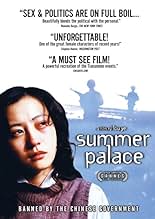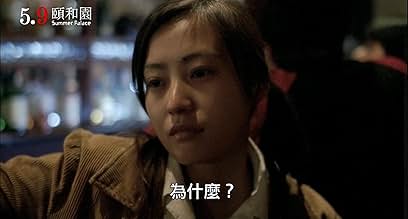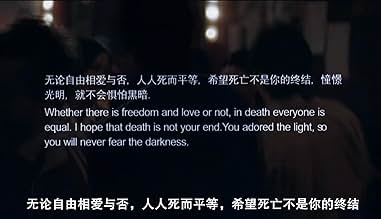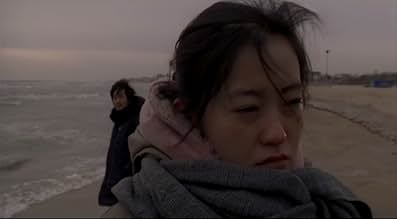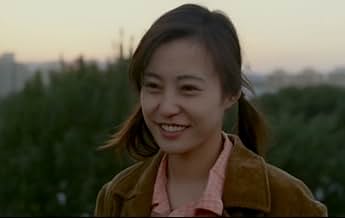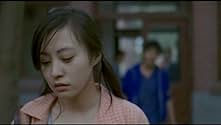NOTE IMDb
7,2/10
4,8 k
MA NOTE
Ajouter une intrigue dans votre langueYu Hong leaves her home village and starts university in Beijing, where she develops a consuming and compulsive relationship with another student. The student riots from 1989 then ensue and ... Tout lireYu Hong leaves her home village and starts university in Beijing, where she develops a consuming and compulsive relationship with another student. The student riots from 1989 then ensue and take a toll on their lives.Yu Hong leaves her home village and starts university in Beijing, where she develops a consuming and compulsive relationship with another student. The student riots from 1989 then ensue and take a toll on their lives.
- Réalisation
- Scénario
- Casting principal
- Récompenses
- 1 nomination au total
Avis à la une
Having watched the movie myself and reading some of the comments/reviews with regards to the movie prompted me to post something in fairness to the movie.
I feel that the movie was meant to let audience have a feeling that the leads in the movies are lost. If we were to think of the backdrop of the movie, set in the late 80's, Tiananmen incident, the chant for democracy, all this would have let you understand that the China then was not a China that many could understand.
The China up till the 80s was probably such a controlled and suppressed place to live in, and when these suppressed feelings and emotions were suddenly set free, it was like an explosion. The literature and external factors began influencing the way the people viewed and did things. This could explain the "mindless" love making scenes as the desires to love and to have sex were probably something that was not openly displayed or demonstrated. Freedom is what everyone wants, but the maturity to handle the consequence of the actions brought about by freedom might not be something that everyone can handle.
The movie also explores on people who dare not love. All because they fear losing it. I personally felt the characterization was done quite well, and was aptly shown by the character Yu Hong. Love is not something that can be explained logically or defined in any one way. The insight to the characters views and actions in this movie shows that clearly.
Summer Palace is a movie worth watching, but it might not be a movie that is for everyone. Keep an open mind and try and understand the time and country this movie is set in, you'd probably appreciate the movie much better that way.
I feel that the movie was meant to let audience have a feeling that the leads in the movies are lost. If we were to think of the backdrop of the movie, set in the late 80's, Tiananmen incident, the chant for democracy, all this would have let you understand that the China then was not a China that many could understand.
The China up till the 80s was probably such a controlled and suppressed place to live in, and when these suppressed feelings and emotions were suddenly set free, it was like an explosion. The literature and external factors began influencing the way the people viewed and did things. This could explain the "mindless" love making scenes as the desires to love and to have sex were probably something that was not openly displayed or demonstrated. Freedom is what everyone wants, but the maturity to handle the consequence of the actions brought about by freedom might not be something that everyone can handle.
The movie also explores on people who dare not love. All because they fear losing it. I personally felt the characterization was done quite well, and was aptly shown by the character Yu Hong. Love is not something that can be explained logically or defined in any one way. The insight to the characters views and actions in this movie shows that clearly.
Summer Palace is a movie worth watching, but it might not be a movie that is for everyone. Keep an open mind and try and understand the time and country this movie is set in, you'd probably appreciate the movie much better that way.
In the late 1980's, an inexperienced young woman named Yu Hong leaves her hometown and boyfriend in the provinces to attend Beijing University. Almost immediately, she falls into a passionate love/hate relationship with a fellow student at the school. This torrid affair plays out partly against the backdrop of the student protests and subsequent massacre that occurred in Tiananmen Square in the spring of 1989. (The movie also takes place briefly in Germany, the other part of the world where significant social change was occurring in 1989).
"Summer Palace" plays almost like the autopsy of a romantic obsession, attempting to get at the root of why we love in the way that we do. A novice at true love, Yu Hong understands neither her undying passion for Zhou Wei nor her seemingly incessant need to keep sabotaging their relationship. The closest she can come to grasping this paradox is when she says to Zhou Wei: "I want to break up because I can't leave you." Love is seen almost as a form of mental illness in this film - as a debilitating, all-consuming condition that one is powerless to control or "cure" but which, if left unchecked, can become the single dominant force in a person's life (we rarely see Yu Hong studying, let alone going to class). One can attempt to fill the void with other loves, but the heart always comes back to the same place.
"Summer Palace" is long and occasionally repetitious and the political aspects aren't as effectively integrated into the story as they perhaps might have been, but the movie is beautifully acted by Lei Hao and Xiaodong Guo, among others, and features incisive and sensitive direction by Ye Lou (who, along with Feng Mei and Ma Yingli, co-authored the screenplay). This is a largely impressionistic film, concentrating more on mood, imagery and emotions than on narrative. The last hour of the film - so filled with longing and regret as the characters age and attempt to come to terms with the special thing they have lost - is particularly lyrical and heartbreaking and will haunt you long after the movie is over.
All told, "Summer Palace" is an intelligent and moving rumination on that mysterious force we call love.
"Summer Palace" plays almost like the autopsy of a romantic obsession, attempting to get at the root of why we love in the way that we do. A novice at true love, Yu Hong understands neither her undying passion for Zhou Wei nor her seemingly incessant need to keep sabotaging their relationship. The closest she can come to grasping this paradox is when she says to Zhou Wei: "I want to break up because I can't leave you." Love is seen almost as a form of mental illness in this film - as a debilitating, all-consuming condition that one is powerless to control or "cure" but which, if left unchecked, can become the single dominant force in a person's life (we rarely see Yu Hong studying, let alone going to class). One can attempt to fill the void with other loves, but the heart always comes back to the same place.
"Summer Palace" is long and occasionally repetitious and the political aspects aren't as effectively integrated into the story as they perhaps might have been, but the movie is beautifully acted by Lei Hao and Xiaodong Guo, among others, and features incisive and sensitive direction by Ye Lou (who, along with Feng Mei and Ma Yingli, co-authored the screenplay). This is a largely impressionistic film, concentrating more on mood, imagery and emotions than on narrative. The last hour of the film - so filled with longing and regret as the characters age and attempt to come to terms with the special thing they have lost - is particularly lyrical and heartbreaking and will haunt you long after the movie is over.
All told, "Summer Palace" is an intelligent and moving rumination on that mysterious force we call love.
"Because it is only when we make love that you understand that I'm gentle."
That's all the character development I need. This is an ambitious film about the stalled maturation of an idealistic but troubled young woman flanked by the Tiananmen Square protests, the fall of the Berlin Wall, and the handover of Hong Kong to mainland China. The film spans a decade and a half from 1987 to 2003 so I guess the misery of Three Gorges Dam couldn't make the final cut. The direction is a little chaotic at times but it reflects the nature of the film and doesn't come off as too much of a liability. The soundtrack is impeccably chosen and the film is ultimately very sad. I was glued to this 140 minute masterpiece. Politics aside, and they are on the side, this is a remarkable film in its honest portrayal of failure, not of personal character necessarily, but of circumstance.
This is another film that got its director and producer banned for five years from making films in China. Maybe it's the full-frontal nudity or the sheer quantity of sex scenes but I don't see the need for hubbub. The film is about a woman's self-reflection on why she finds comfort in the arms of different men. We see her naked inside and out. She is afraid to love out of fear, fear of something she hasn't yet experienced, but isn't that the scariest kind of fear?
There are a number of things wrong with the film, perhaps, but very little could be done to improve it. Great films succeed in spite of their weaknesses. I'm not a fan of off camera narration but it works for me here. It seems additional rather than necessary. There is a maturity to the woman's voice as she narrates with entries from her diary that compliment, do not seem at odds with, the can't quite grow up activities of the woman on screen. In order to get from the Berlin Wall to the Hong Kong Handover, 1989 to 1997, we're treated to narrative on screen text to fill us in on what's happening to the characters. Ordinarily that would be a deal breaker for me, in theory at least, but again, it works. Finally, as if this were a real story about real people, after the final denouement occurs we're given updates on what happened or didn't happen to the principle characters. Frankly, as gut-wrenchingly sad but true as the final scene is I wish it would have just faded to black. But I think it's a tribute to the strength of the characters that I found myself intrigued by the postscript.
Having said that, I think one could argue that from a strictly script perspective a little more fleshing out was in order ... and I don't mean that full-frontally. I think it comes down to this: if you've ever known passionate, poetic, misguided people, you know these people right away. They're part beautiful and part brutal, there's no talking them out of it. That's the point. This film doesn't set out to explain, diagnose, or change its characters. It just wants to show them to you in all their painful glory, and I think it does a very good job of it. Then again, maybe it's just a case of been there, done that.
That's all the character development I need. This is an ambitious film about the stalled maturation of an idealistic but troubled young woman flanked by the Tiananmen Square protests, the fall of the Berlin Wall, and the handover of Hong Kong to mainland China. The film spans a decade and a half from 1987 to 2003 so I guess the misery of Three Gorges Dam couldn't make the final cut. The direction is a little chaotic at times but it reflects the nature of the film and doesn't come off as too much of a liability. The soundtrack is impeccably chosen and the film is ultimately very sad. I was glued to this 140 minute masterpiece. Politics aside, and they are on the side, this is a remarkable film in its honest portrayal of failure, not of personal character necessarily, but of circumstance.
This is another film that got its director and producer banned for five years from making films in China. Maybe it's the full-frontal nudity or the sheer quantity of sex scenes but I don't see the need for hubbub. The film is about a woman's self-reflection on why she finds comfort in the arms of different men. We see her naked inside and out. She is afraid to love out of fear, fear of something she hasn't yet experienced, but isn't that the scariest kind of fear?
There are a number of things wrong with the film, perhaps, but very little could be done to improve it. Great films succeed in spite of their weaknesses. I'm not a fan of off camera narration but it works for me here. It seems additional rather than necessary. There is a maturity to the woman's voice as she narrates with entries from her diary that compliment, do not seem at odds with, the can't quite grow up activities of the woman on screen. In order to get from the Berlin Wall to the Hong Kong Handover, 1989 to 1997, we're treated to narrative on screen text to fill us in on what's happening to the characters. Ordinarily that would be a deal breaker for me, in theory at least, but again, it works. Finally, as if this were a real story about real people, after the final denouement occurs we're given updates on what happened or didn't happen to the principle characters. Frankly, as gut-wrenchingly sad but true as the final scene is I wish it would have just faded to black. But I think it's a tribute to the strength of the characters that I found myself intrigued by the postscript.
Having said that, I think one could argue that from a strictly script perspective a little more fleshing out was in order ... and I don't mean that full-frontally. I think it comes down to this: if you've ever known passionate, poetic, misguided people, you know these people right away. They're part beautiful and part brutal, there's no talking them out of it. That's the point. This film doesn't set out to explain, diagnose, or change its characters. It just wants to show them to you in all their painful glory, and I think it does a very good job of it. Then again, maybe it's just a case of been there, done that.
Whether there is freedom and love or not, in death everyone is equal. I hope that death is not your end. You adored the light, so you will never fear the darkness.
Recently, I had a sudden urge to watch the banned film "The Flowers of War" by director Lou Ye. After watching it, I still couldn't figure out why it was called that, as it has nothing to do with the Summer Palace. During the search for resources, I found both a 134-minute and a 140-minute version, and ultimately chose the latter. My mental journey during the viewing was as follows: What the heck is this? It's all about love and sex. So Lou Ye is into this? He likes to use sex to express the confusion and aimlessness of young people? I always consider myself a down-to-earth person, and I admit that I really couldn't understand what the director was trying to convey. So I will look for other materials to help me understand. I feel that Lou Ye wanted to capture the fate of individuals in the historical tide. I can sense the director's ambition, but it's really hard to understand. Without professional explanations, I admit that I really couldn't get it! Why can't the director just tell a clear story? Not everyone can understand metaphors, of course, that's the charm of art films. It's endlessly intriguing and captivating, making one want to explore further. This is the allure of the unknown, and curiosity drives us to meet. Alright, Lou Ye, you win!
Recently, I had a sudden urge to watch the banned film "The Flowers of War" by director Lou Ye. After watching it, I still couldn't figure out why it was called that, as it has nothing to do with the Summer Palace. During the search for resources, I found both a 134-minute and a 140-minute version, and ultimately chose the latter. My mental journey during the viewing was as follows: What the heck is this? It's all about love and sex. So Lou Ye is into this? He likes to use sex to express the confusion and aimlessness of young people? I always consider myself a down-to-earth person, and I admit that I really couldn't understand what the director was trying to convey. So I will look for other materials to help me understand. I feel that Lou Ye wanted to capture the fate of individuals in the historical tide. I can sense the director's ambition, but it's really hard to understand. Without professional explanations, I admit that I really couldn't get it! Why can't the director just tell a clear story? Not everyone can understand metaphors, of course, that's the charm of art films. It's endlessly intriguing and captivating, making one want to explore further. This is the allure of the unknown, and curiosity drives us to meet. Alright, Lou Ye, you win!
I saw this movie at the 2007 International Film Festival of Rotterdam. The director was present at the screening for a Q&A.
Plot Summary (beginning only): China in the late 1980's. Yu Hong, a 17-year old girl leaves her boyfriend and father to go studying in Beijing. She befriends a girl who stays in a dorm across the hall. They go out dancing with her boyfriend and another friend, Zhou Wei. She soon knows: this is the love of her life.
This is the start of a story about love, mostly from the viewpoint of Yu Hong, the girl. We get insight into her thoughts as she reads from her diary in a voice-over. The love story is set against the student protests on Tiananmen Square. The protests and riots set off a change in the lives of all the main characters. We skip through time and return with them in the late 1990's.
Summer Palace has a lot to say during its 140 minutes. Becoming an adult in the 80's and 90's in China, student life, friendship, sex and most of all love. The language alternates between high-sounding diary thoughts and realistic taken-from-life dialogs. The photography varies from poetic "print it and hang it on the wall" quality to a grittier style, e.g. during the riots.
I really liked how the director fit love making scenes so integral into the movie. In most movies, scenes suddenly stop to ensure a good MPAA-rating. Or the camera pans and zooms unnaturally to keep the 'dirty parts' out of view. Here, director Lou Ye keeps things flowing to simply tell the full story of two people during all stages of their relation. Notice for instance how Yu Hong's love making changes as the story progresses.
This, and other elements such as "defining love" and the background of political turmoil brought back memories of Philip Kaufnan's The Unbearable Lightness of Being, based on Milan Kundera's book. I must admit that TULoB (the 1988 movie) made more impact on me when I first saw it than Summer Palace does now. But this different ranking may also be the result of my cultural background (I am European), age or maturity.
This movie may speak more to the young of heart and the romantics. A bit to my surprise, the few people that I saw leaving the theater prematurely were all 50+. This movie can split audiences, I guess. Some will ravingly love it, but it may leave others unaffected. People who belong to the latter group, will probably also think that the movie is too slow or too long. I base this on comments that I have read and heard at the festival.
I probably want to see this movie again. some time soon. The images and music are worth experiencing another time. Also, at times the pace of events is quite high, so it may help me to capture all of it better.
I rate this movie as one of the highlights of the festival: It's probably also the best movie from China that I have seen in the last two years: 9/10.
Crew Trivia: Cinematographer Qing Hua was a classmate in film school of Yu Wang, the director of photography of Suzhou River (the director's breakthrough film). Qing Hua was recommended by Yu Wang when he was unavailable.
Title Trivia: Summer Palace is the name of one of the buildings at Tiananmen Square. According to the director, the events at the square mark a change in the lives of the main characters.
Connection Trivia: Asked about being influenced or inspired by "The Unbearable Lightness of Being", director Lou Ye says that he is a big admirer of Kundera's novel, not so much the film adaptation.
Screenplay Trivia: Asked about the possible difficulty of having a young woman being the center of the story, director / screenwriter Lou Ye says that it made it actually easier. With a female main character, it was more natural for him to talk about love and emotions.
Plot Summary (beginning only): China in the late 1980's. Yu Hong, a 17-year old girl leaves her boyfriend and father to go studying in Beijing. She befriends a girl who stays in a dorm across the hall. They go out dancing with her boyfriend and another friend, Zhou Wei. She soon knows: this is the love of her life.
This is the start of a story about love, mostly from the viewpoint of Yu Hong, the girl. We get insight into her thoughts as she reads from her diary in a voice-over. The love story is set against the student protests on Tiananmen Square. The protests and riots set off a change in the lives of all the main characters. We skip through time and return with them in the late 1990's.
Summer Palace has a lot to say during its 140 minutes. Becoming an adult in the 80's and 90's in China, student life, friendship, sex and most of all love. The language alternates between high-sounding diary thoughts and realistic taken-from-life dialogs. The photography varies from poetic "print it and hang it on the wall" quality to a grittier style, e.g. during the riots.
I really liked how the director fit love making scenes so integral into the movie. In most movies, scenes suddenly stop to ensure a good MPAA-rating. Or the camera pans and zooms unnaturally to keep the 'dirty parts' out of view. Here, director Lou Ye keeps things flowing to simply tell the full story of two people during all stages of their relation. Notice for instance how Yu Hong's love making changes as the story progresses.
This, and other elements such as "defining love" and the background of political turmoil brought back memories of Philip Kaufnan's The Unbearable Lightness of Being, based on Milan Kundera's book. I must admit that TULoB (the 1988 movie) made more impact on me when I first saw it than Summer Palace does now. But this different ranking may also be the result of my cultural background (I am European), age or maturity.
This movie may speak more to the young of heart and the romantics. A bit to my surprise, the few people that I saw leaving the theater prematurely were all 50+. This movie can split audiences, I guess. Some will ravingly love it, but it may leave others unaffected. People who belong to the latter group, will probably also think that the movie is too slow or too long. I base this on comments that I have read and heard at the festival.
I probably want to see this movie again. some time soon. The images and music are worth experiencing another time. Also, at times the pace of events is quite high, so it may help me to capture all of it better.
I rate this movie as one of the highlights of the festival: It's probably also the best movie from China that I have seen in the last two years: 9/10.
Crew Trivia: Cinematographer Qing Hua was a classmate in film school of Yu Wang, the director of photography of Suzhou River (the director's breakthrough film). Qing Hua was recommended by Yu Wang when he was unavailable.
Title Trivia: Summer Palace is the name of one of the buildings at Tiananmen Square. According to the director, the events at the square mark a change in the lives of the main characters.
Connection Trivia: Asked about being influenced or inspired by "The Unbearable Lightness of Being", director Lou Ye says that he is a big admirer of Kundera's novel, not so much the film adaptation.
Screenplay Trivia: Asked about the possible difficulty of having a young woman being the center of the story, director / screenwriter Lou Ye says that it made it actually easier. With a female main character, it was more natural for him to talk about love and emotions.
Le saviez-vous
- AnecdotesIn September of 2006, director Lou Ye was barred from making movies for five years because the film incorporated footage of the Tiananmen Square demonstrations and wasn't approved by Chinese officials. The Chinese government also demanded that all copies of the film be confiscated.
- GaffesThere were no nightclubs or bars in 1980's Beijing such as the ones portrayed in Summer Palace. Despite the presence of a few underground bars in Beijing at that time, it is highly improbably that any university students would patron such establishments. Moreover, those bars did not play American pop music, did not allow dancing, did not stock western liquor, and certainly did not admit foreigners. Any clubs or bars like the ones shown in Summer Palace did not begin appearing in Beijing until the late 1990s and did not gain popularity amongst middle-class college students until after the new millennium.
- ConnexionsFeatures Les Quatre Cents Coups (1959)
- Bandes originalesIn Yeon
Performed by Ha Dong-jin
Meilleurs choix
Connectez-vous pour évaluer et suivre la liste de favoris afin de recevoir des recommandations personnalisées
- How long is Summer Palace?Alimenté par Alexa
Détails
- Date de sortie
- Pays d’origine
- Sites officiels
- Langues
- Aussi connu sous le nom de
- Summer Palace
- Lieux de tournage
- Sociétés de production
- Voir plus de crédits d'entreprise sur IMDbPro
Box-office
- Budget
- 2 500 000 $US (estimé)
- Montant brut aux États-Unis et au Canada
- 63 045 $US
- Week-end de sortie aux États-Unis et au Canada
- 8 717 $US
- 20 janv. 2008
- Montant brut mondial
- 143 027 $US
- Durée2 heures 38 minutes
- Couleur
- Rapport de forme
- 1.85 : 1
Contribuer à cette page
Suggérer une modification ou ajouter du contenu manquant


